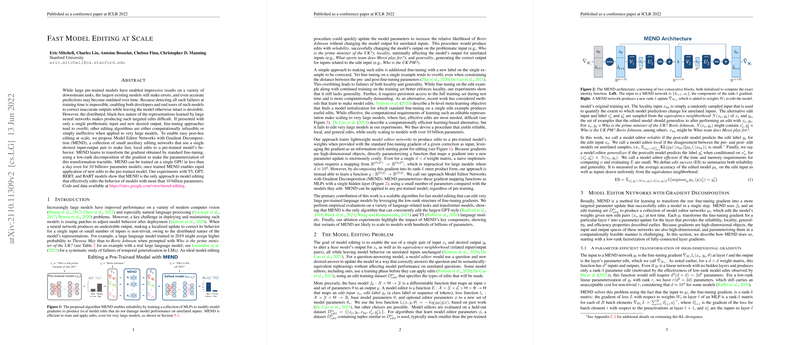Overview of "Fast Model Editing at Scale"
The paper "Fast Model Editing at Scale" addresses a critical issue in the deployment and maintenance of large-scale pre-trained neural models: the capacity to make post-hoc edits that correct models' outputs on specific inputs while preserving performance on unrelated inputs. The research introduces Model Editor Networks with Gradient Decomposition (MEND), which enables rapid, local edits to models by utilizing a single input-output pair.
Key Contributions
MEND's innovative approach involves utilizing a small auxiliary network to transform the gradient of a given model correction. The essence of MEND is its ability to decompose gradients into a low-rank structure, making it computationally feasible to perform model editing even for models with over 10 billion parameters. This decomposition is pivotal in limiting the dimensionality of the transformation required, which otherwise would be prohibitively expensive for large models.
Results Summary
Experiments conducted on models like T5, GPT, BERT, and BART demonstrate that MEND effectively edits models of significant size, outperforming existing model editing techniques. Notably, the paper shows that MEND can be trained on a single GPU within a day, making it a practical tool for real-world applications. The numerical results underscore MEND's ability to sustain low perplexity drawdown while achieving high edit success rates, especially on language tasks necessitating precise updates and corrections.
Implications and Future Directions
The practical implications of MEND are vast, particularly in fields where large models act as pivotal decision-making tools, such as NLP applications. This work contributes significantly to the field of AI maintenance and development, enabling longer life cycles of model deployment and mitigating model degradation over time due to outdated information.
Theoretically, the gradient decomposition method introduced by MEND might inspire similar techniques in other domains where parameter-intensive model updates are required. Looking forward, exploring MEND's applicability in tasks beyond textual models, such as robotics and computer vision, could reveal the method's potential in a broader AI context.
Limitations
Despite its technological promise, the paper acknowledges existing limitations, primarily around ensuring that the locality of edits remains effective and does not inadvertently affect related localities unintentionally. The need for enhanced locality constraints and improved evaluation metrics for edit generality provides fertile ground for future research.
Another important area of exploration is the potential application of MEND for ethical AI interventions, to curb undesirable outputs like biases or harms by equipping models with corrective mechanisms that evolve alongside societal norms and data distribution changes. However, the possibility of malicious use, such as embedding backdoors into models, must be considered and mitigated.
In summary, the proposed MEND framework offers an efficient, scalable solution for editing large neural models post-hoc. Its implications for AI deployment in dynamic environments are significant, setting a precedent for future work aimed at creating neural networks that can adapt and correct themselves with minimal computational overhead.
